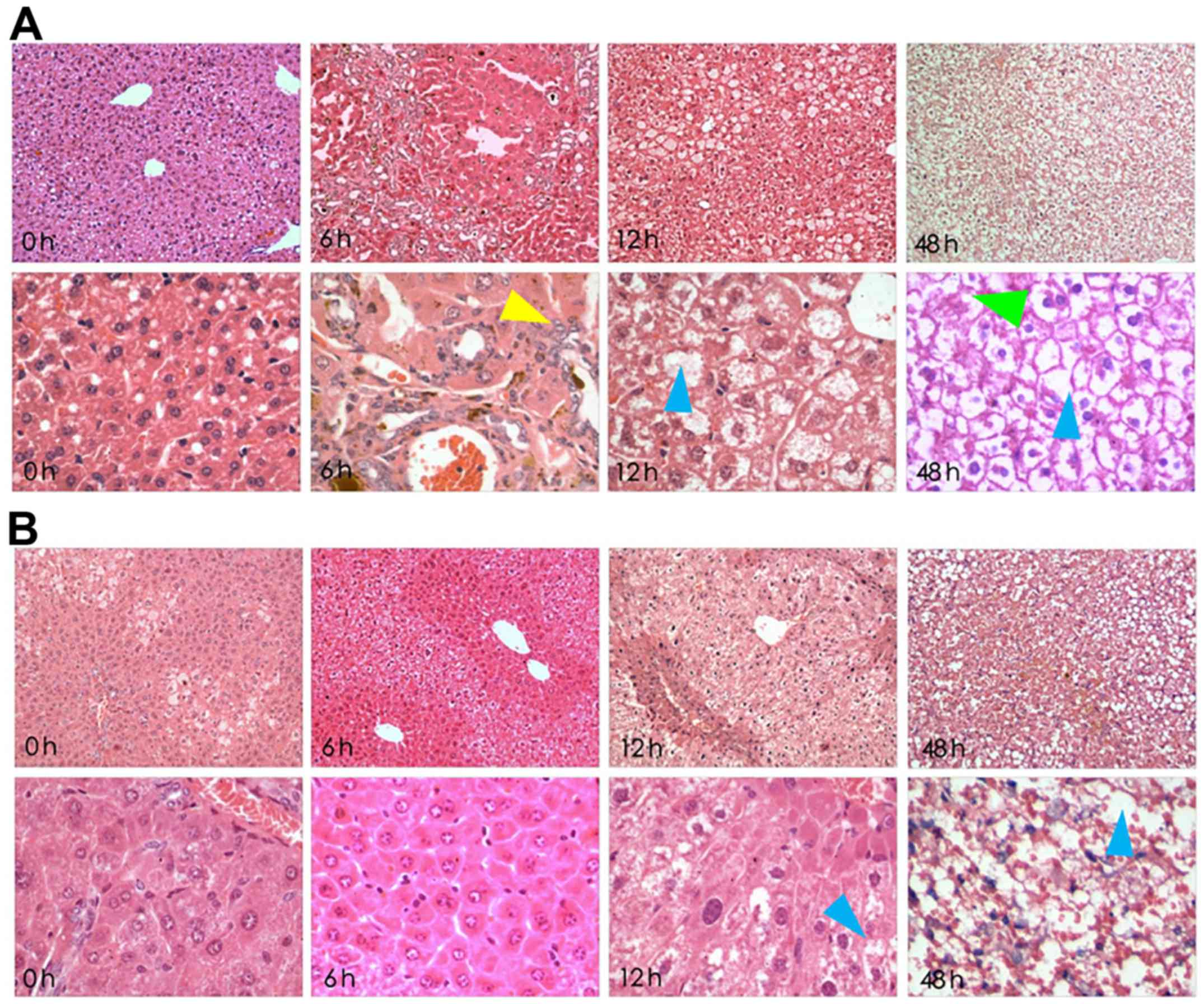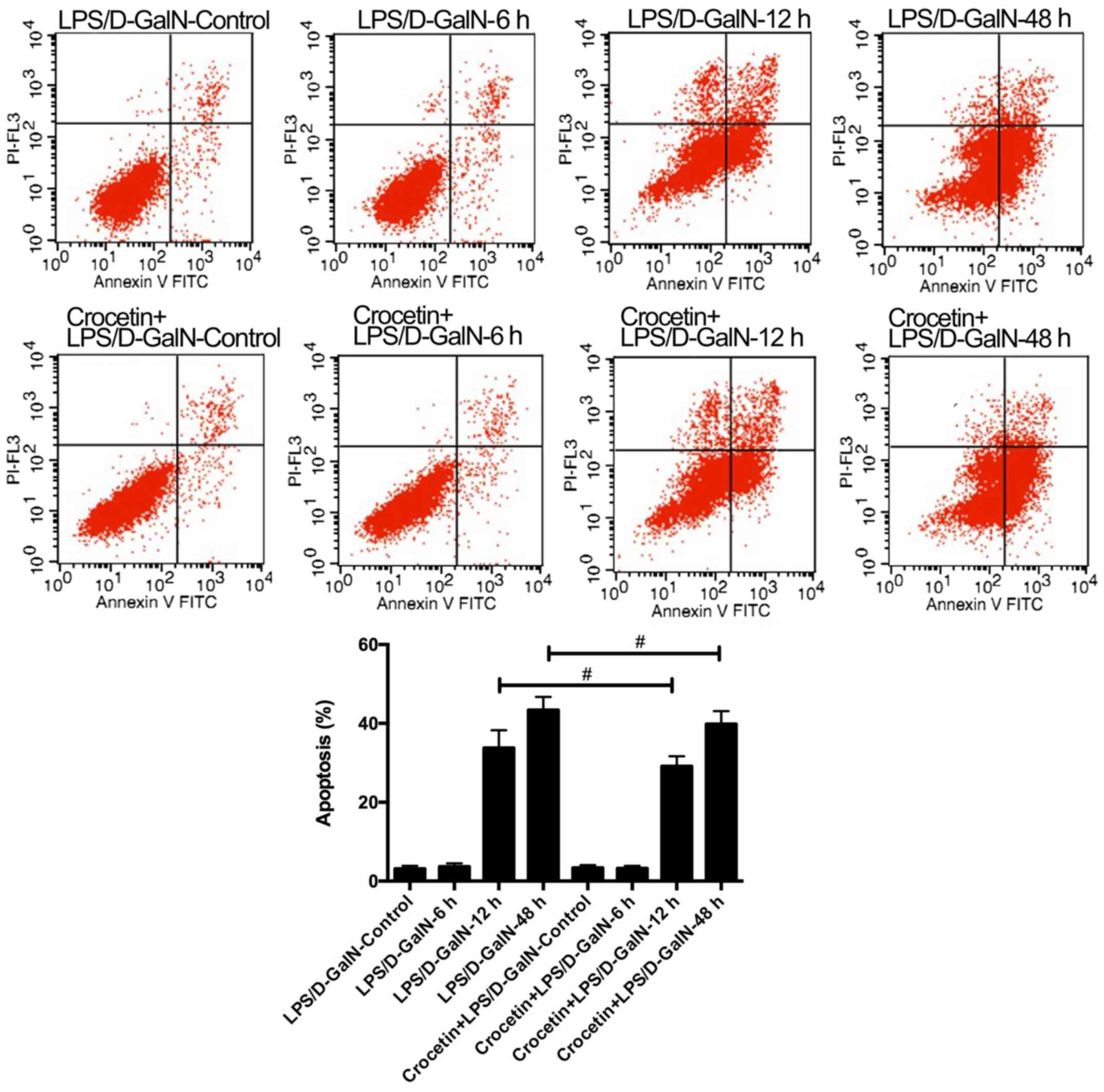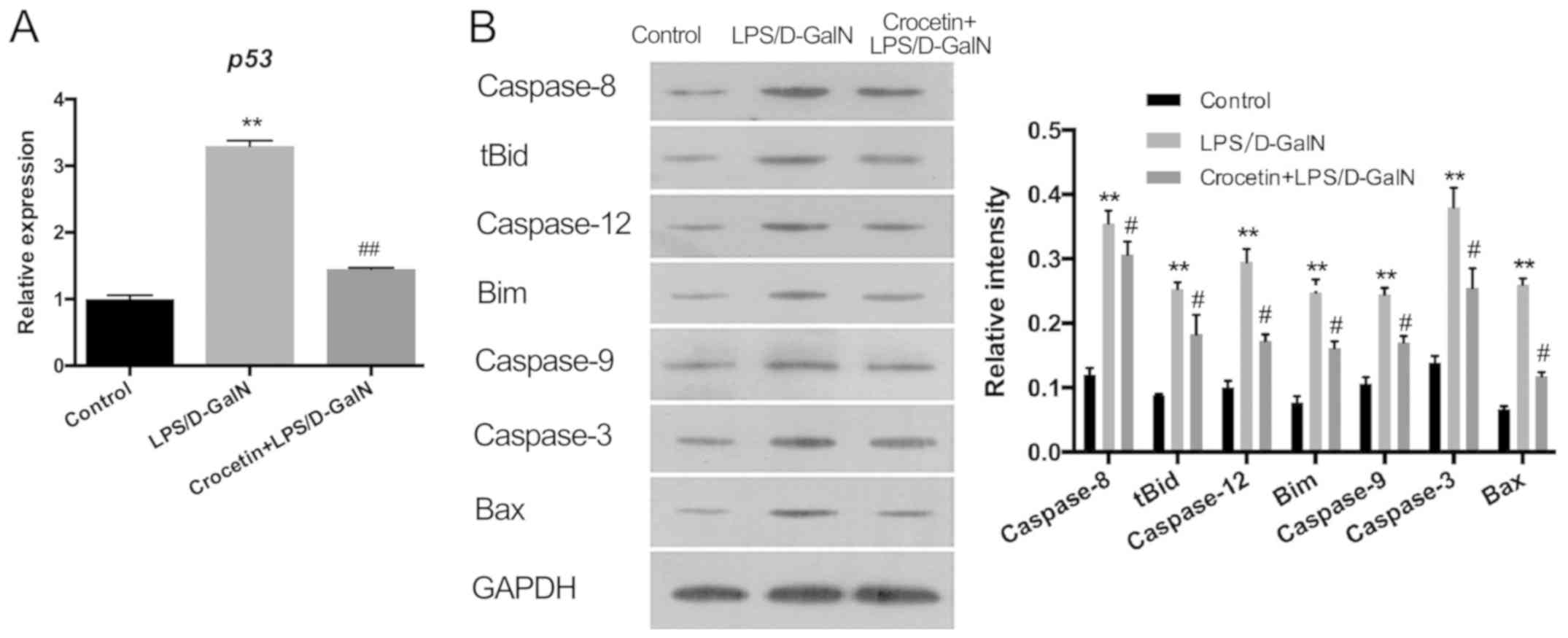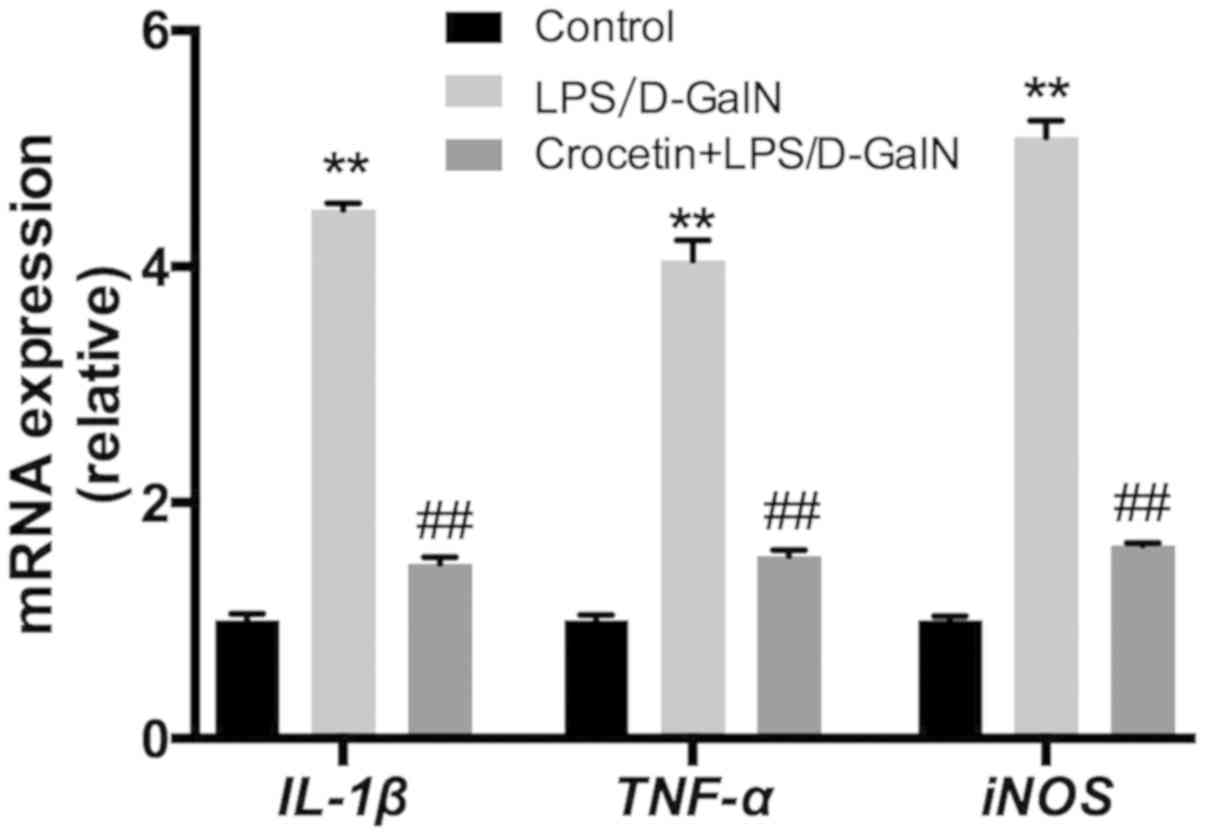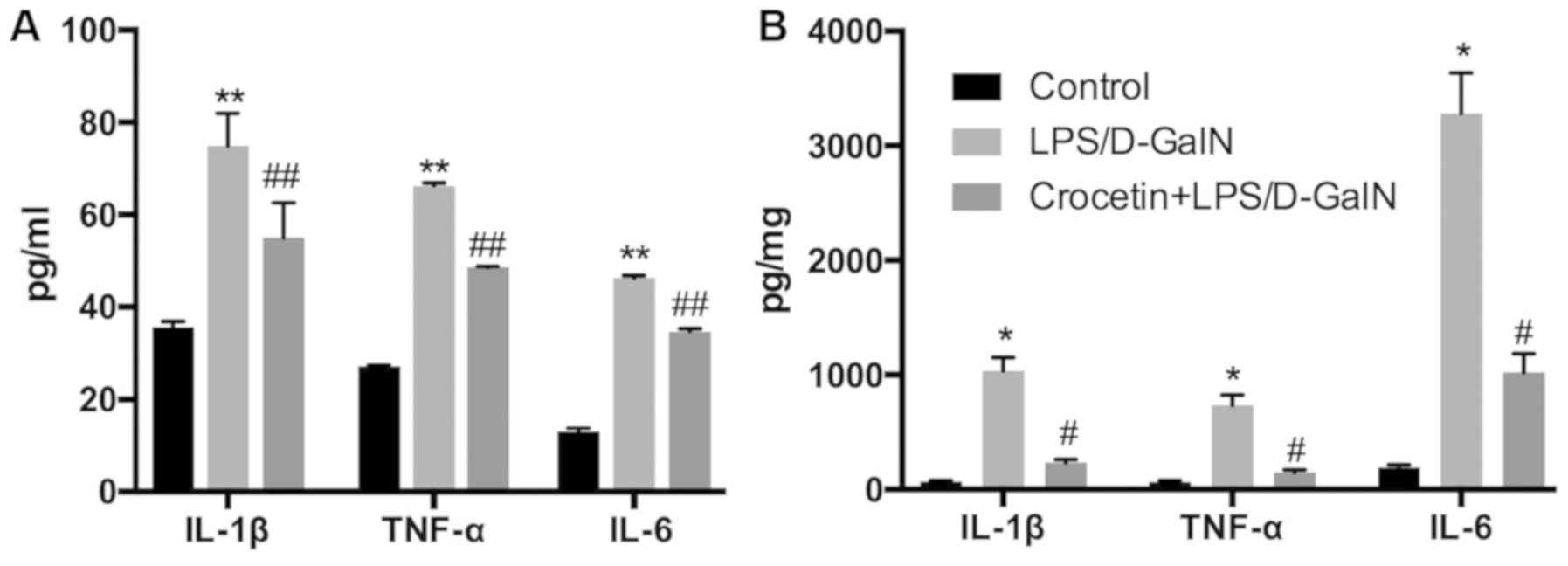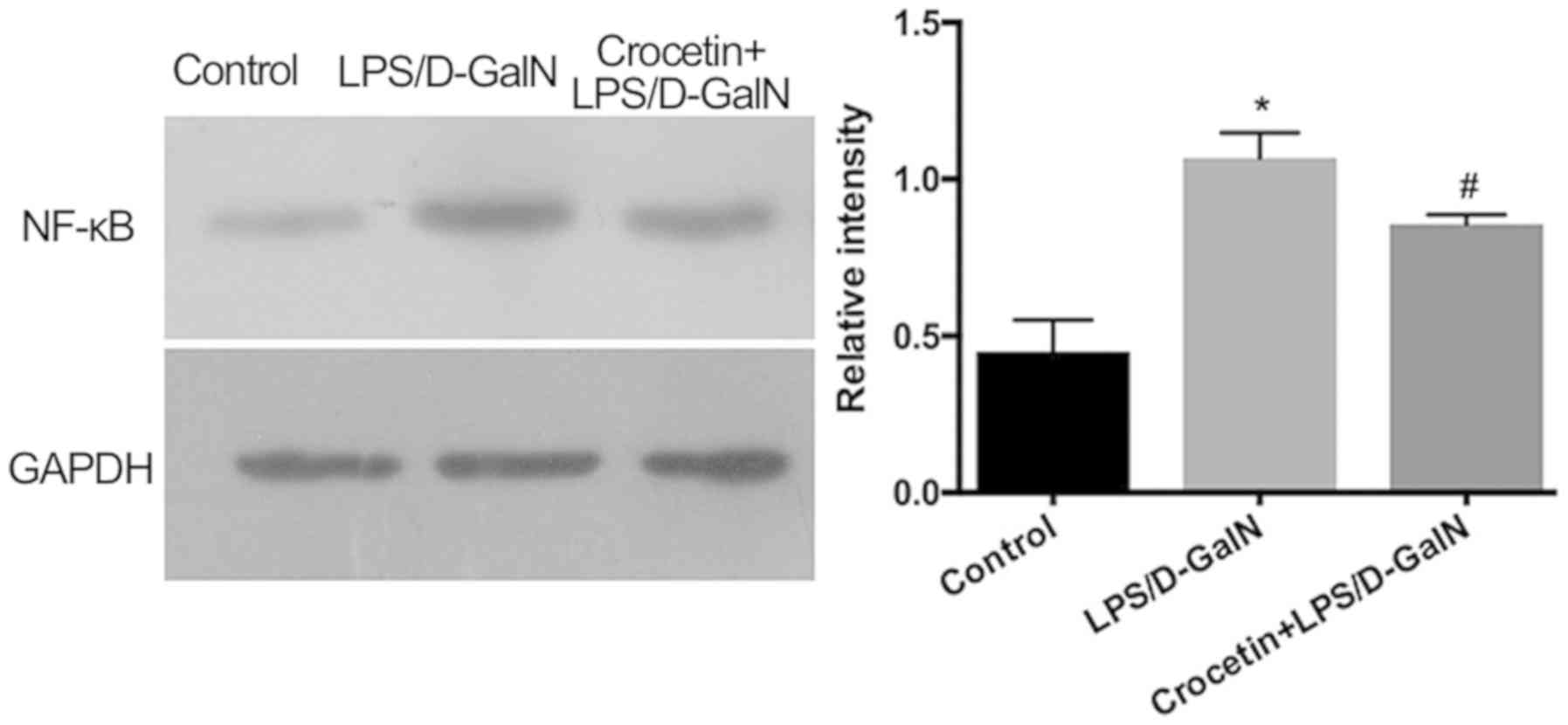|
1
|
El-Agamy DS, Makled MN and Gamil NM:
Protective effects of agmatine against D-galactosamine and
lipopolysaccharide-induced fulminant hepatic failure in mice.
Inflammopharmacology. 22:187–194. 2014. View Article : Google Scholar : PubMed/NCBI
|
|
2
|
Zhang X, Ding J, Gou C, Wen T, Li L, Wang
X, Yang H, Liu D, Lou J, Cehn D, et al: Qingchangligan formula
attenuates the in inflammatory response to protect the liver from
acute failure induced by d-galactosamine/lipopolysaccharide in
mice. J Ethnopharmacol. 201:108–116. 2017. View Article : Google Scholar : PubMed/NCBI
|
|
3
|
Lee SB, Kang JW, Kim SJ, Ahn J, Kim J and
Lee SM: Afzelin ameliorates Dgalactosamine and
lipopolysaccharide-induced fulminant hepatic failure by modulating
mitochondrial quality control and dynamics (150/150). Brit J
Pharmacol. 174:195–209. 2017. View Article : Google Scholar
|
|
4
|
Marzio HD and Sass DA: Fulminant hepatic
failure: Diagnosis and managementSpringer International Publishing;
Switzerland: pp. 229–245. 2014
|
|
5
|
Nasralla D, Coussios CC, Mergental H,
Akhtar MZ, Butler AJ, Ceresa CD, Chiocchia V, Dutton SJ,
Garcia-Valdecasas JC, Heaton N, et al: A randomized trial of
normothermic preservation in liver transplantation. Nature.
557:50–56. 2018. View Article : Google Scholar : PubMed/NCBI
|
|
6
|
Duan GJ, Zhu J, Xu CY, Wan JY, Zhang L, Ge
XD, Liu LM and Liu YS: Protective effect of Go6976, a PKD
inhibitor, on LPS/d-GalN-induced acute liver injury in mice.
Inflamm Res. 6:357–366. 2011. View Article : Google Scholar
|
|
7
|
Jaeschke H: Reactive oxygen and mechanisms
of inammatory liver injury. J Gastroenterol Hepatol. 7:718–724.
2000. View Article : Google Scholar
|
|
8
|
Ben Ari Z, Avlas O, Pappo O, Veacheslav Z,
Cheporko Y, Bachmetov L, Zemel R, Asher S, Sharon E, Grief F and
Hochhauser E: Reduced hepatic injury in toll-like receptor
4-deficient mice following D-galactosamine/lipopolysaccharide
induced fulminant hepatic failure. Cell Physiol Biochem. 29:41–50.
2012. View Article : Google Scholar : PubMed/NCBI
|
|
9
|
Kim SJ, Kim JK, Lee DU, Kwak JH and Lee
SM: Genipin protects lipopolysaccharide-induced apoptotic liver
damage in D-galactosamine-sensitized mice. Eur J Pharmacol.
635:188–193. 2010. View Article : Google Scholar : PubMed/NCBI
|
|
10
|
Bolhassani A, Khavari A and Bathaie SZ:
Saffron and natural carotenoids: Biochemical activities and
anti-tumor effects. Biochem Biophys Acta. 1845:20–30.
2014.PubMed/NCBI
|
|
11
|
Cao W, Cui J, Li S, Zhang D, Guo Y, Li Q,
Luan Y and Liu X: Crocetin restores diabetic endothelial progenitor
cell dysfunction by enhancing NO bioavailability via regulation of
PI3K/AKT-eNOS and ROS pathways. Life Sci. 181:9–16. 2017.
View Article : Google Scholar : PubMed/NCBI
|
|
12
|
Zhuang X, Dong A, Wang R and Shi A:
Crocetin treatment inhibits proliferation of colon cancer cells
through down-regulation of genes involved in the inflammation.
Saudi J Biol Sci. 25:1767–1771. 2018. View Article : Google Scholar : PubMed/NCBI
|
|
13
|
Yang R, Vernon K, Thomas A, Morrison D,
Qureshi N and Van Way CW III: Crocetin reduces activation of
hepatic apoptotic pathways and improves survival in experimental
hemorrhagic shock. JPEN J Parenter Enteral Nutr. 35:107–113. 2011.
View Article : Google Scholar : PubMed/NCBI
|
|
14
|
Chen P, Chen Y, Wang Y, Cai S, Deng L, Liu
J and Zhang H: Comparative evaluation of hepatoprotective
activities of geniposide, crocins and crocetin by CCl4-induced
liver injury in mice. Biomol Ther (Seoul). 24:156–162. 2016.
View Article : Google Scholar : PubMed/NCBI
|
|
15
|
Liu LM, Zhang JX, Luo J, Guo HX, Deng H,
Chen JY and Sun SL: A role of cell apoptosis in lipopolysaccharide
(LPS)-induced nonlethal liver injury in D-galactosamine
(D-GalN)-sensitized Rats. Digest Dis Sci. 53:1316–1324. 2008.
View Article : Google Scholar : PubMed/NCBI
|
|
16
|
Gao K, Guo H, Liu L, Ding Y, Kuang M and
Li J: Liver protection of crocetin against paraquat poisoning in
rats. Chin Crit Care Med. 28:876–880. 2016.(In Chinese).
|
|
17
|
Guo H, Gao K, Zou X, Deng Q, Chen M and
Liu F: Crocetin promotes autophagy in injured rat hepatocytes
induced by lipopolysaccharide and D-galactosamine in vitro. Nan
Fang Yi Ke Da Xue Xue Bao. 38:1121–1125. 2018.(In Chinese).
PubMed/NCBI
|
|
18
|
Xin J, Zeng D, Wang H, Ni X, Yi D, Pan K
and Jing B: Preventing non-alcoholic fatty liver disease through
Lactobacillus johnsonii BS15 by attenuating inflammation and
mitochondrial injury and improving gut environment in obese mice.
Appl Microbiol Biotechnol. 98:6817–6829. 2014. View Article : Google Scholar : PubMed/NCBI
|
|
19
|
Livak KJ and Schmittgen TD: Analysis of
relative gene expression data using real-time quantitative PCR and
the 2(-Delta Delta C(T)) method. Methods. 25:402–408. 2001.
View Article : Google Scholar : PubMed/NCBI
|
|
20
|
Lin X, Zhang S, Huang R, Tan S, Liang S,
Wu X, Zhuo L and Huang Q: Protective effect of tormentic acid from
Potentilla chinensis against lipopolysaccharide/D-galactosamine
induced fulminant hepatic failure in mice. Int Immunopharmacol.
19:365–372. 2014. View Article : Google Scholar : PubMed/NCBI
|
|
21
|
Ryan CJ, Aslam M and Courtney JM:
Transference of hepatic coma to normal rats from galactosamine
treated donors by reverse plasma exchange. Biomater Artif Cells
Artif Organs. 18:477–482. 1990. View Article : Google Scholar : PubMed/NCBI
|
|
22
|
Pushpavalli G, Kalaiarasi V, Veeramani C
and Pugalendi KV: Effect of chrysin on hepatoprotective and
antioxidant status in D-galactosamine-induced hepatitis in rats.
Eur J Pharmacol. 631:36–41. 2010. View Article : Google Scholar : PubMed/NCBI
|
|
23
|
Poojari R, Gupta S, Maru G, Khade B and
Bhagwat S: Chemopreventive and hepatoprotective effects of embelin
on N-nitrosodiethylamine and carbon tetrachloride induced
preneoplasia and toxicity in rat liver. Asian Pac J Cancer Prev.
11:1015–1020. 2010.PubMed/NCBI
|
|
24
|
Gavric A, Ribnikar M, Šmid L, Luzar B and
Stabuc B: Fat burner induced acute liver injury: Case series of
four patients. Nutrition. 47:110–114. 2018. View Article : Google Scholar : PubMed/NCBI
|
|
25
|
Chen B, Jiang L, Hao K, Wang L, Wang Y,
Xie Y, Shen J, Zhu M, Tong X, Li K and Wang Z: Protection of plasma
transfusion against lipopolysaccharide/d-galactosamine-induced
fulminant hepatic failure through inhibiting apoptosis of hepatic
cells in mice. J Zhejiang Univ Sci B. 19:436–444. 2018. View Article : Google Scholar
|
|
26
|
Giorgi C, Bonora M, Sorrentino G,
Missiroli S, Poletti F, Suski J, Galindo Ramirez F, Rizzuto R, Di
Virgilio F, Zito E, et al: p53 at the endoplasmic reticulum
regulates apoptosis in a Ca2+-dependent manner. Proc
Natl Acad Sci USA. 112:1779–1784. 2015. View Article : Google Scholar : PubMed/NCBI
|
|
27
|
Leifeld L, Nattermann J, Fielenbach M,
Schmitz V, Sauerbruch T and Spengler U: Intrahepatic activation of
caspases in human fulminant hepatic failure. Liver Int. 26:872–879.
2006. View Article : Google Scholar : PubMed/NCBI
|
|
28
|
Budihardjo I, Oliver H, Lutter M, Luo X
and Wang X: Biochemical pathways of caspase activation during
apoptosis. Annu Rev Cell Dev Biol. 15:269–290. 1999. View Article : Google Scholar : PubMed/NCBI
|
|
29
|
Nakagawa T, Zhu H, Morishima N, Li E, Xu
J, Yankner BA and Yuan J: Caspase-12 mediates
endoplasmic-reticulum-specific apoptosis and cytotoxicity by
amyloid-beta. Nature. 403:98–103. 2000. View Article : Google Scholar : PubMed/NCBI
|
|
30
|
Heather H, Kenneth H, Samik G and Tung KC:
Construction and analysis of a modular model of caspase activation
in apoptosis. Theor Biol Med Model. 5:262008. View Article : Google Scholar : PubMed/NCBI
|
|
31
|
Grosse L, Wurm CA, Brüser C, Neumann D,
Jans DC and Jakobs S: Bax assembles into large ring-like structures
remodeling the mitochondrial outer membrane in apoptosis. EMBO J.
35:402–413. 2016. View Article : Google Scholar : PubMed/NCBI
|
|
32
|
Tan CT, Zhou QL, Su YC, Fu NY, Chang HC,
Tao RN, Sukumaran SK, Baksh S, Tan YJ, Sabapathy K, et al: MOAP-1
mediates Fas-induced apoptosis in liver by facilitating tBid
recruitment to mitochondria. Cell Rep. 16:174–185. 2016. View Article : Google Scholar : PubMed/NCBI
|
|
33
|
Lv H, Qi Z, Wang S, Feng H, Deng X and Ci
X: Asiatic acid exhibits anti-inflammatory and antioxidant
activities against lipopolysaccharide and d-galactosamine-induced
fulminant hepatic failure. Front Immunol. 8:7852017. View Article : Google Scholar : PubMed/NCBI
|
|
34
|
Korhonen R, Lahti A, Kankaanranta H and
Moilanen E: Nitric oxide production and signaling in inflammation.
Curr Drug Targets Inflamm Allergy. 4:471–479. 2005. View Article : Google Scholar : PubMed/NCBI
|
|
35
|
Rockey DC and Chung JJ: Reduced nitric
oxide production by endothelial cells in cirrhotic rat liver:
Endothelial dysfunction in portal hypertension. Gastroenterology.
114:344–351. 1998. View Article : Google Scholar : PubMed/NCBI
|
|
36
|
Shah V, Toruner M, Haddad F, Cadelina G,
Papapetropoulos A, Choo K, Sessa WC and Groszmann RJ: Impaired
endothelial nitric oxide synthase activity associated with enhanced
caveolin binding in experimental cirrhosis in the rat.
Gastroenterology. 117:1222–1228. 1999. View Article : Google Scholar : PubMed/NCBI
|
|
37
|
Petermann H, Vogl S, Schulze E and Dargel
R: Chronic liver injury alters basal and stimulated nitric oxide
production and 3H-thymidine incorporation in cultured sinusoidal
endothelial cells from rats. J Hepatol. 31:284–292. 1999.
View Article : Google Scholar : PubMed/NCBI
|
|
38
|
Sass G, Koerber K, Bang R, Guehring H and
Tiegs G: Inducible nitric oxide synthase is critical for
immune-mediated liver injury in mice. J Clin Invest. 107:439–447.
2001. View
Article : Google Scholar : PubMed/NCBI
|
|
39
|
Huang CC, Lin KJ, Cheng YW, Hsu CA, Yang
SS and Shyur LF: Hepatoprotective effect and mechanistic insights
of deoxyelephantopin, a phyto-sesquiterpene lactone, against
fulminant hepatitis. J Nutr Biochem. 3:516–530. 2013. View Article : Google Scholar
|
|
40
|
Kim YI, Park SW, Yoon YK, Lee KW, Lee JH,
Woo HJ and Kim Y: Orostachys japonicus inhibits the expression of
MMP-2 and MMP-9 mRNA and modulates the expression of iNOS and COX-2
genes in human PMA-differentiated THP-1 cells via inhibition of
NF-κB and MAPK activation. Mol Med Rep. 12:657–662. 2015.
View Article : Google Scholar : PubMed/NCBI
|
|
41
|
Gao K, Liu F, Guo H, Li J, Zhang Y and Mo
Z: miR-224 suppresses HBV replication posttranscriptionally through
inhibiting SIRT1-mediated autophagy. Int J Clin Exp Pathol.
11:189–198. 2018.
|
|
42
|
Reddy PV, Murthy ChR and Reddanna P:
Fulminant hepatic failure induced oxidative stress in nonsynaptic
mitochondria of cerebral cortex in rats. Neurosci Lett. 368:15–20.
2004. View Article : Google Scholar : PubMed/NCBI
|
|
43
|
Wang Y, Wu Y, Wang B, Xu H, Mei X, Xu X,
Zhang X, Ni J and Li W: Bacillus amyloliquefaciens SC06
protects mice against high-fat diet-induced obesity and liver
injury via regulating host metabolism and gut microbiota. Front
Microbiol. 10:11612019. View Article : Google Scholar : PubMed/NCBI
|















